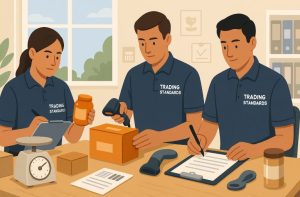Have you ever been wronged by a company and wondered what you could do about it? Reporting the business to Trading Standards might be the answer.
Understanding your rights and knowing the correct steps can help ensure your complaint is taken seriously and action is taken against rogue traders.
What Is Trading Standards?

Trading Standards is a vital service operated by local authorities across the UK. They are responsible for enforcing a wide range of legislation designed to protect consumers and ensure that businesses trade fairly and legally.
Their work covers sectors as diverse as food safety, product safety, consumer credit, and the sale of age-restricted products. If a business engages in activities that mislead, endanger, or defraud consumers, Trading Standards officers have the authority to investigate and take action.
These officers work both reactively, responding to complaints, and proactively, carrying out inspections and test purchases.
Understanding the Role of Trading Standards in the UK
You might think Trading Standards only get involved in serious criminal activity, but they intervene in everyday issues that affect the safety and rights of consumers. They ensure businesses:
- Sell safe, correctly described products
- Provide accurate pricing
- Honour consumer rights and guarantees
Their powers allow them to enter premises, seize goods, and, if necessary, bring criminal prosecutions against rogue traders.
Common Issues Trading Standards Handle
While some cases can be minor, others involve serious breaches of the law. The table below illustrates typical issues Trading Standards addresses:
| Issue Type | Example |
| Unsafe Products | Faulty electrical goods that pose a fire hazard |
| Misleading Advertising | A holiday advertised with amenities that do not exist |
| Underage Sales | Selling alcohol or tobacco to minors |
| Scams and Fraud | Fake online stores collecting money but not delivering goods |
| Pricing Violations | Hidden fees not disclosed at the time of purchase |
When Should You Report a Company to Trading Standards?
There are specific circumstances when you should take action and report a business. It’s important to distinguish between poor service, which may be dealt with elsewhere, and actual breaches of the law, which fall under Trading Standards’ remit.
Situations That Warrant a Report
You should report a business when:
- You have been sold unsafe goods, such as toys with small, detachable parts or food items past their expiry dates.
- The business misrepresented their product or service. For instance, booking a four-star hotel which turns out to be a budget hostel.
- There was pressure selling involved, where you were coerced into purchasing something you did not want or need.
- You were scammed online, paying for goods that never arrived.
- The business tried to block or limit your statutory consumer rights, like refusing to accept a return of faulty goods.
- Pricing information was misleading or incomplete, hiding extra fees at the checkout.
- Age-restricted products were sold without proper identification checks.
Examples of Reportable Offences
To give you a clearer picture, here’s another table:
| Reportable Situation | Business Misconduct |
| You were sold fake branded clothing | Intellectual property violation |
| A locksmith charged hidden fees after emergency service | Breach of transparency regulations |
| A pub sold alcohol to minors without ID checks | Breach of Licensing Act |
| You paid for furniture installation, but it was dangerously unstable | Unsafe service provision |
How Can You Report a Business to Trading Standards?

If you believe a business has broken the law, acted unfairly, or endangered consumer rights, you have the right to report them to Trading Standards.
However, you cannot report a business directly to Trading Standards yourself. In the UK, all initial complaints must go through the Citizens Advice consumer service, which acts as a national gateway for consumer issues.
This system ensures that Trading Standards teams only receive actionable complaints that meet legal criteria, allowing them to focus on serious breaches and systemic problems affecting consumers.
Reporting Through Citizens Advice Consumer Service
The Citizens Advice consumer service plays a crucial role in filtering and forwarding complaints to the appropriate local Trading Standards authority. Their trained advisers assess your issue, offer initial advice, and decide whether your complaint should be escalated for formal investigation.
You have two main options to submit your complaint:
- Online Report Form: You can submit your issue by filling out the online form available through the Citizens Advice website. Note that this form is typically accessible outside of standard office hours, from 5 PM on Friday until 9 AM on Monday. This ensures weekend reports are processed appropriately.
- Phone Support from an Adviser: If you prefer speaking to someone directly or if your issue is urgent or complex, you can call the Citizens Advice consumer helpline. An adviser will guide you through the process, help you structure your complaint, and make sure all necessary information is provided.
Regardless of the method you choose, it’s important to provide as much detail as possible to strengthen your case and enable quicker action.
What Information You Need to Provide?
When reporting a business, having the right information prepared can make the process smoother and more effective. Typically, you will be asked for:
- The full name and address of the business involved
- A detailed description of the problem, including what happened and when
- Any communications you have had with the business (emails, letters, call logs)
- Evidence of purchase or agreement (receipts, invoices, contracts, screenshots)
- Information on the outcome you are seeking, if applicable
If you submit the complaint online, Citizens Advice aims to respond to you within five working days. If you speak to an adviser by phone, they will give you advice immediately and confirm if your case is being passed to Trading Standards.
Why You Should Always Report?
Even if you resolve the issue personally or receive compensation from the business, it’s still valuable to report unfair practices. Trading Standards rely on consumers to highlight breaches that otherwise might go unnoticed. Your single report could prevent harm to hundreds of others if it helps stop a rogue trader, recall unsafe goods, or uncover a scam operation.
Comparison of Reporting Options
| Reporting Method | Details | Availability |
| Online Form | Submit complaint through Citizens Advice website | Available Friday 5 PM to Monday 9 AM |
| Phone Call | Speak to an adviser for immediate guidance | During business hours |
By understanding how to report effectively, you not only seek justice for yourself but also play an important role in protecting the wider community from unfair or dangerous business practices.
What Happens After You Report to Trading Standards?

Once you submit a report through the Citizens Advice consumer service, the information is passed to the relevant local Trading Standards authority for assessment. However, the process that follows is not always visible to you, and many people are often unsure about what happens behind the scenes.
Trading Standards must first decide whether your report falls within their jurisdiction and if it merits a formal investigation. This decision is based on the nature of the complaint, the level of consumer harm, the public interest, and the evidence provided.
If your report is deemed serious enough, Trading Standards may begin an investigation immediately. In other cases, your complaint may be recorded and kept on file, particularly if it supports a pattern of complaints against the same business. Even isolated complaints can become critical if similar issues are reported by others later on.
You should be aware that, due to confidentiality and legal reasons, Trading Standards typically do not keep you updated about their investigations or outcomes unless they need further information from you. This approach ensures that legal processes are not compromised and that businesses are treated fairly under investigation.
Investigation and Evidence Review
When Trading Standards decides to proceed with an investigation, they will start by thoroughly reviewing all the evidence you provided. They may also gather additional evidence by:
- Conducting inspections or visits to the business premises.
- Interviewing employees, customers, or other witnesses.
- Carrying out “test purchases” to experience the business’s practices first-hand.
- Working with other enforcement bodies, such as the police, the Food Standards Agency, or HM Revenue and Customs, if necessary.
Officers might seize goods that are unsafe, counterfeit, or misdescribed. They can also obtain warrants to search business properties if there is strong evidence of serious wrongdoing.
At this stage, your role may shift from reporter to witness. If Trading Standards decide to prosecute the business, they might contact you to provide a witness statement or to testify in court. This step only happens in serious cases where a criminal prosecution is justified.
Possible Actions Trading Standards Might Take
Depending on the findings, Trading Standards can take a range of actions against a business, including:
- Providing advice or issuing a warning: If the breach is minor or accidental, Trading Standards may work informally with the business to ensure compliance without immediate penalties.
- Serving statutory notices: This includes improvement notices, prohibition notices, or suspension notices that require the business to correct unlawful practices immediately.
- Imposing fixed penalty fines: For certain types of infringements, fines may be issued without needing to go to court.
- Seizing and destroying unsafe goods: For example, counterfeit items or unsafe electrical products can be removed from circulation permanently.
- Seeking civil injunctions: In some cases, particularly involving unfair trading practices, Trading Standards can obtain court orders to prevent businesses from continuing harmful activities.
- Prosecuting the business in court: For serious violations, Trading Standards can bring criminal proceedings that may result in heavy fines, bans on trading, or even prison sentences for company directors or owners.
- Collaborating with national agencies: If the issue spans multiple regions or involves widespread consumer harm, Trading Standards may escalate the case to agencies like the Competition and Markets Authority (CMA) or the National Trading Standards Board.
It’s important to understand that action taken will often depend on factors such as the scale of the issue, whether the breach was intentional, and the likelihood of repeat offences.
Even if your individual report does not lead to immediate, visible enforcement, it plays a critical role in building evidence against businesses engaging in systemic wrongdoing.
Will You Receive Updates After Reporting?

It is natural to want updates about the action taken against the business you reported. However, Trading Standards operates under strict confidentiality rules.
When Trading Standards Will Contact You?
You will only be contacted if further information is required from you to assist the investigation. They will not typically update you with case progress or outcomes to protect both legal proceedings and personal privacy.
How Your Report May Be Used in Future Cases?
Even if you don’t see immediate action, your report remains valuable. Trading Standards keeps records of all complaints and uses them to identify patterns of behaviour over time.
Repeat offenders may be investigated more deeply or prosecuted based on cumulative evidence, including yours.
What Other Actions Can You Take If a Business Wronged You?
Besides reporting to Trading Standards, you have other avenues available if you wish to resolve a personal grievance or recover lost money.
Making a Formal Complaint
Before escalating matters, you should send a formal complaint to the business. Include:
- A clear description of the problem
- What resolution you are seeking
- Copies of relevant receipts, invoices, or contracts
Most businesses will attempt to resolve complaints at this stage to avoid negative publicity or regulatory scrutiny.
Using Alternative Dispute Resolution
If a direct complaint does not succeed, you could use a dispute resolution scheme. Many industries have sector-specific ADR schemes that are cheaper, faster, and less formal than court proceedings.
Examples include:
- Financial Ombudsman Service (for financial complaints)
- Consumer Ombudsman (for retail and services)
Taking Legal Action
As a last resort, you can consider taking the business to a small claims court. This option is suitable for straightforward cases involving claims up to £10,000 in England and Wales.
While this path requires preparation and possibly court fees, it can result in legally binding orders for the business to compensate you.
How Can You Protect Yourself Against Unfair Trading Practices?

Prevention is always better than cure. Taking steps to protect yourself from dishonest businesses is essential.
Tips for Spotting Scams
- Research companies before purchasing, especially if the deal seems unusually good.
- Always use secure payment methods like credit cards or reputable payment platforms.
- Check company reviews and look for consistent feedback across multiple sources.
- Be cautious of businesses with no physical address or unclear contact details.
Knowing Your Consumer Rights
Educating yourself about key consumer laws can empower you to act decisively when faced with unfair practices.
Understanding the Consumer Rights Act 2015, the Consumer Protection from Unfair Trading Regulations 2008, and other important legislation can give you the upper hand.
| Protection Area | Key Consumer Rights |
| Faulty Goods | Right to refund, repair, or replacement |
| Digital Content | Must be as described and functional |
| Services | Must be provided with reasonable care and skill |
| Online Purchases | Right to cancel within 14 days |
Conclusion
Reporting a company to Trading Standards is an essential step in protecting yourself and others from unfair, unsafe, or illegal business practices. By understanding the process and your rights, you can make sure your concerns are heard and acted upon.
Remember, while Trading Standards might not fix your individual problem, your report could prevent others from suffering the same fate. Stay informed, act promptly, and protect your consumer rights.
FAQs
How do I know if my issue is serious enough to report to Trading Standards?
If a business’s actions were unsafe, illegal, or misleading, it’s serious enough to report, even if the financial impact was minor.
Can I report anonymously to Trading Standards?
Yes, you can request to remain anonymous when contacting Citizens Advice, who will pass the information accordingly.
Will Trading Standards refund my money?
No, Trading Standards focus on enforcement and preventing future misconduct; they cannot recover your personal losses.
How long does a Trading Standards investigation take?
Investigations vary depending on complexity, evidence available, and whether broader legal action is being considered.
What evidence should I keep for my Trading Standards report?
Keep all receipts, contracts, emails, photos, and written communications to support your case.
Are businesses always prosecuted after a Trading Standards report?
Not always. Some issues are resolved with warnings or advice, while others may lead to fines or court actions.
What can I do if I need urgent help with a consumer issue?
Contact the Citizens Advice consumer service immediately for assistance and further advice on your specific case.








